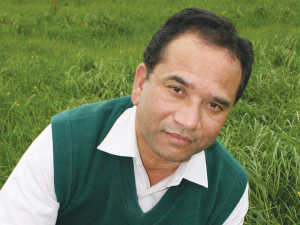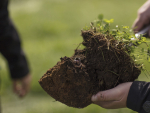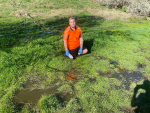Decline in soil physical properties takes considerable expense and many years to correct, and can increase the risk of soil erosion by water or wind.
So safeguarding the soil for present and future generations is a key task of land managers.
Practices that damage soil include over-cultivation, under or over-fertilisation, decreased or increased water abstraction, indiscriminate use of pesticides and other agri-chemicals, clearing natural vegetation, intensive farming practices, and very importantly, failure to maintain soil organic matter levels.
Average soil carbon stocks in New Zealand’s agricultural soils estimated at about 100 tonnes per hectare in the top 30cm, any change in soil carbon could make a significant contribution to carbon footprints at national, industry and farm scales.
Farmers face a new environmental issue, with recent research showing some dairy soils are losing more carbon and nitrogen than dry stock and hill country areas. Dairy farms on non-allophanic soils have lost an average of one tonne of soil carbon per hectare a year in some parts of the country.
Biologically active carbon is the most important part of the soil carbon and how it is distributed through the soil profile is equally important. Soil carbon is found primarily in organic forms, which make up soil organic matter.
A number of international agreements and conventions are likely to influence the management of soils in the near future.
If agricultural soils were to be used as carbon sinks, there would be a greater need and responsibility by farmers and land managers to increase the soil organic carbon content of their soils.
Soil carbon is mostly found in the decomposed remains of plant and animal matter and in soil microbes. Soil carbon shouldn’t be confused with soil organic matter. About 40-50 per cent of soil organic matter is soil carbon by weight.
In order to achieve increases in soil carbon content, it would be necessary to achieve the maximum uptake of various land management practices that contribute to soil sustainability.
The Waikato region has a wide range of soils, including some of New Zealand’s most productive. However, even high quality soils can be degraded through some land use practices. The Waikato Soil Quality monitoring in 2020/21 indicated only 19 per cent of monitored sites fully met all seven targets, while 25 per cent of productive land met all seven targets. Compaction and excessive fertility are the main soil quality issues in the intensively farmed areas.
The development of sustainable soil management practices clearly requires a multidisciplinary approach to find the best solutions. As we look for those answers, it will be the wise farmer who keeps an eye on these issues given their ability to influence the bottom line.
The development of sustainable soil management practices clearly requires a multidisciplinary approach to find the best solutions. As we look for those answers, it will be the wise farmer who keeps an eye on these issues given their ability to influence the bottom line.
VSA has been a good tool in assessing soil quality at farmer level and the results are easy to interpret and understand.
VSA also provides a useful educational and vocational training tool for those unfamiliar with soil science. It creates a better understanding of soil quality and its fundamental importance to sustainable resource and environmental management. In particular, VSA has developed a greater awareness of the importance of soil physical properties (such as soil aeration) in governing soil quality and on-farm production.
The VSA package has been recently updated by adding some more important indicators. The second edition of the VSA is a significant improvement on the first edition, partly because it is better able to assess soil condition and plant performance as a result of a more balanced assessment of soil chemical, biological as well as physical properties. It is more strongly correlated to crop and pasture production and pasture quality, considers key aspects of the subsoil and better addresses the ecological footprint of organic carbon dynamics and environmental issues, including greenhouse gas emissions and nutrient loading (such as nitrogen and phosphorus) into waterways.
VSA will be demonstrated at a field day to be held on Wednesday, 19 October near Te Awamutu. Please visit waikatoregion.govt.nz/public-events for the details and to RSVP.


















